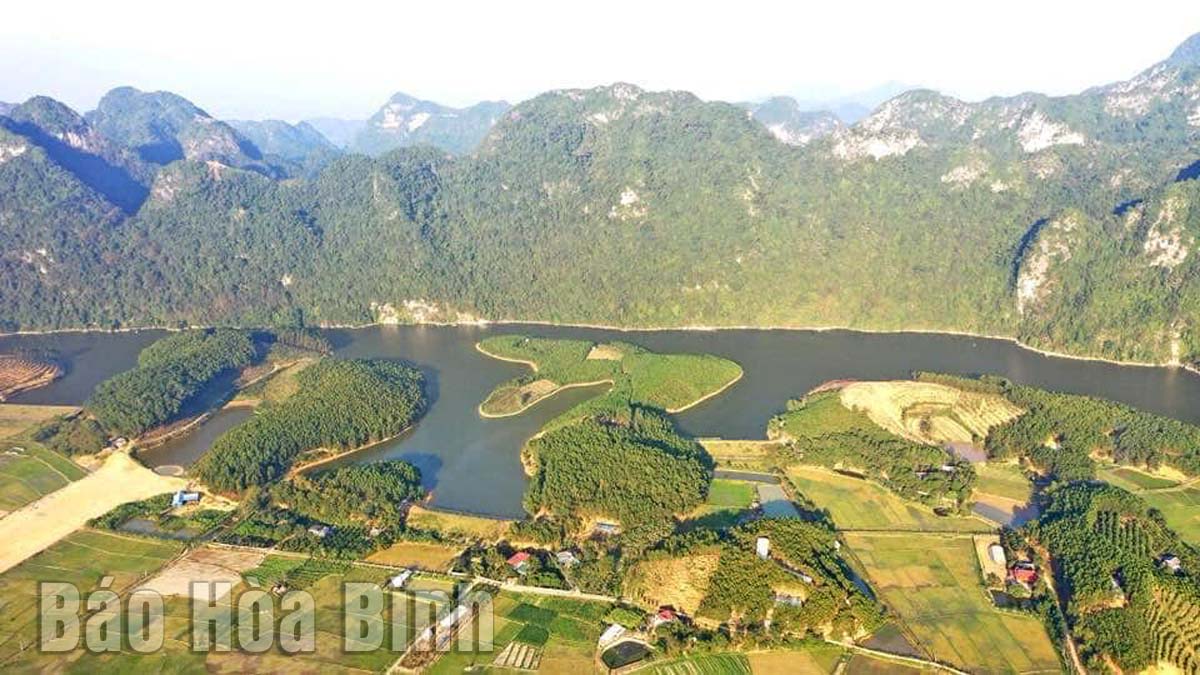
(HBO) – Lac Thuy district in Hoa Binh province has been recognized for putting together a sustainable development plan for the region in order to position itself as the economic driving force of the province in the future.

Tien
pagoda tourist site in Phu Nghia commune is part of Lac Thuy district’s tourism
development plan.
Lac Thuy is a lowland district
of Hoa Binh province, adjacent to areas that are drawing huge investment
dollars, such as Hanoi, Ha Nam and Ninh Binh. The region boasts strategic
traffic routes and favorable conditions for the development of commercial,
tourism, industry, agriculture, and forestry projects.
The district has 10 new projects
on the cards, with seven already budgeted out. Projects that are already
running include the Lac Thuy cultural tourism and resort project and the Huong
Binh cable car route project in Phu Lao commune, with total investment over
1,726 billion VND. The district is also implementing industrial infrastructure
planning in the Dong Tam, Phu Thanh and Thanh Nong industrial clusters, including
a number of important transport infrastructure projects to bolster
socio-economic development.
Lac Thuy district has asked
the province to support the Thanh Nong industrial cluster in accordance with
the local socio-economic development planning and expand the planning of
high-tech environmental industrial clusters in the 2025 – 2030 period from 56.8
ha to 75 ha. The district also proposed to add an eco-resort combined with a
golf course at Doi Do, An Binh commune.
The district has increased
funding for planning and management in the locality, scrutinizing ineffective
projects to ensure those that move forward are sustainable. Officials who undertake
the planning role in communes, townships and relevant agencies are selected
with appropriate professional qualifications and experience./.
Hoa Binh province is undergoing a dynamic transformation amid Vietnam’s national digital transition. Building on Poliburo’s Resolution No. 57-NQ/TW on breakthroughs in science, technology, innovation, and national digital transformation, the province has rolled out a wide range of practical action plans. A standout initiative is the "Digital Literacy for All” movement, an effort to ensure that no one is left behind in the digital era.
Hoa Binh province is undergoing a dynamic transformation in the wake of the national digital transformation movement. Building on Resolution No. 57-NQ/TW of the Politburo on breakthroughs in science, technology, innovation, and national digital transformation, the province has implemented a wide range of practical action plans. A standout initiative is the "Digital Literacy for All” movement ambitious effort to ensure that no one is left behind in the digital age.
With a spirit of unity and proactive problem-solving, the Party Committee, the government and the people of Dong Lai Commune (Tan Lac District) have made great strides in implementing the resolutions of the 24th Party Congress of the commune for the 2020 - 2025 term. Focusing on leadership and practical actions, the commune has brought the Party’s resolutions into daily life, creating strong impacts and pushing the local development forward.
Amid the nationwide push for digital transformation, young people in Hoa Binh Province are stepping up as dynamic pioneers, applying technology to enhance Youth Union operations and expand the reach of youth-led initiatives. Through creativity and adaptability, Youth Union organizations at all levels have introduced a series of practical solutions, contributing to modern governance and community development.
In recent years, An Nghia commune, located in Lac Son district, has stepped up administrative reform, focusing on improving the quality and efficiency of its single-window service unit for receiving and processing administrative procedures. These improvements have helped create favourable conditions for local residents and organisations to handle administrative procedures, contributing to the commune’s broader socio-economic development.
The Prime Minister-approved master plan to develop the multi-use value of forests ecosystems through 2030, with a vision to 2050, aims to improve the management and sustainable use of forest resources, create jobs, increase incomes, and improve the living standards of ethnic minorities, people in mountainous and remote areas, forest workers and those living near forests.



